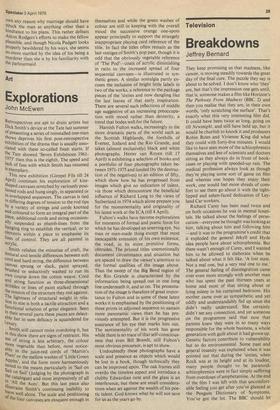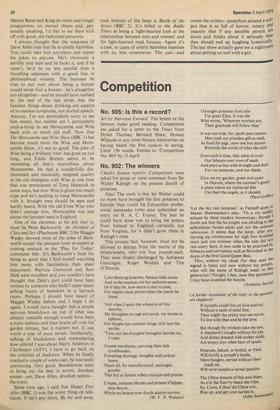Television
Breakdowns
Jeffrey Bernard
They keep promising us that madness, like cancer, is moving steadily towards the great day of the final cure. The puzzle they say is about to be solved. I don't know who 'they' are, but that's the impression one gets until, that is, someone makes a film like Horizon's The Pathway From Madness (BBC 2) and then you realise that they are, in their own words, 'only scratching the surface'. That's exactly what this very interesting film did. It could have been twice as long, going on till Newsnight, and still have held up, but it would be churlish to knock it and producers Robin Bates and Vivienne King did what they could with forty-five minutes. I would like to have seen more of the schizophrenics themselves and less of scientists and doctors sitting as they always do in front of book- cases or playing with speeded-up rats. The medical profession always look as though they're playing some sort of game on film and whereas one hopes they enjoy their work, one would feel more shreds of com- fort to see them go about it with the tight- lipped and ashen-faced dedication of Ley- land Car workers.
Richard Carey has been mad twice and on both occasions he was in mental hospi- tals. He talked about the feelings of perse- cution—everyone he thought was looking at him, talking about him and following him —and it was to the programme's credit that it exploded the general Jekyll and Hyde idea people have about schizophrenia. But there wasn't enough of Carey, and I wanted him to be allowed to elaborate when he talked about what it felt like. 'A lost state. Not a real one, but a very real one to me.' The general feeling of disintegration came over even more strongly with another man who has spent the past thirteen years at home and most of that sitting about or lying asleep in his curtained bedroom. His mother came over as sympathetic and yet oddly and understandably fed up since she didn't really understand. She certainly didn't see any connection, and yet someone on the programme said that now that parents knew they were in so many ways responsible for the whole business, a whole generation with guilt about it had grown up. Genetic factors contribute to vulnerability but so do environmental. Some past and general insanity was explained when it was pointed out that during the 'sixties, when Rock was at its height and at its loudest, many people thought to be paranoid- schizophrenics were in fact simply suffering from overdoses of amphetamine. At the end of the film I was left with that uncomfort- able feeling you get after you've glanced at the Penguin Dictionary of Symptoms. You've got the lot. The BBC should let Messrs Bates and King do more and longer programmes on mental illness and, per- sonally speaking, I'd like to see them kick off with good, old-fashioned paranoia.
I always thought that the weakness of Dave Allen was that he is utterly harmless. You could take him anywhere and repeat his jokes to anyone. He's obviously a terribly nice man and he looks it, and if he wasn't, he'd be no less painful than a travelling salesman with a good line in philosophical whimsy. The business he tries to put over about being a boozer would never fool a boozer—he's altogether too altogether—and he should have realised by the end of the last series that the funniest things about drinking are aspects of its nastiest symptoms, not slurred speech, Anyway, I'm not particularly sorry to see him rested, but neither am I particularly cock-a-hoop to see Morecambe and Wise back with so much old stuff. Now that The Morecambe and Wise Show (BBC I) has become much more the Wise and More- cambe Show, it's not so good. The joke of Wise being a brilliant 'riter' has gone on too long, and Eddie Braben seems to be repressing all that's marvellous about Morecambe. He had a wonderfully dis- illusioned and manically resigned quality in the old dialogues with Wise at one time that was reminiscent of Tony Hancock in some ways, but now Wise is given too much rope and he's tending to hang Morecambe with it. Straight men should be seen and hardly heard. With the old Ernie Wise who didn't upstage him, Morecambe was just about the funniest man in England.
One of the cleverest, at his job that is, must be Peter Barkworth. An Accident of Class and Sex (Playhouse BBC 2) by Maggie Wadey showed most of the sides of Bark- worth except the pleasant loser so expert at coming unstuck in the 'Play for Today' commuter belt. It's Barkworth's fault for being so good that I find myself watching him more with fascination than sheer enjoyment. Patricia Garwood and Sam Dale were excellent and you wouldn't have thought that Dale's part could have been written by someone who hadn't spent head- aching hours of boredom in a barrack room. Perhaps I should have heard of Maggie Wadey before and I hope I do again. 1 would have thought that a simple nervous breakdown on top of what was already unstable enough would have been a more realistic end than brains all over the garden terrace, but it matters not. It was worth a year of most serials. Incidentally, talking of breakdown and remembering how unkind I was about Harry Andrews in Clayhanger (ATV), I have to go back on the criticism of Andrews. When he finally cracked a couple of weeks ago, he was really convincing. Very good. Breakdowns seem to bring out the best in actors, drunken scenes—yes, Dave Allen, drunken scenes— the worst.
Some time ago, I said that Happy Ever After (BBC 1) was the worst thing on tele- vision. It isn't any more. By far and away rock bottom of the heap is Battle of the Sexes (BBC 2). It's billed in the Radio Times as being a 'light-hearted look at the relationship between men and women' and for light-hearted read fatuous. Again it's a case, or cases of utterly harmless inanities with no bite whatsoever. The cast—and worse the writers—pussyfoot around a sub- ject that is so full of horror, misery and insanity that if any sensible person sits down and thinks about it seriously then they should end up laughing hysterically. The last show actually gave me a nightmare about getting on well with a girl.



































 Previous page
Previous page